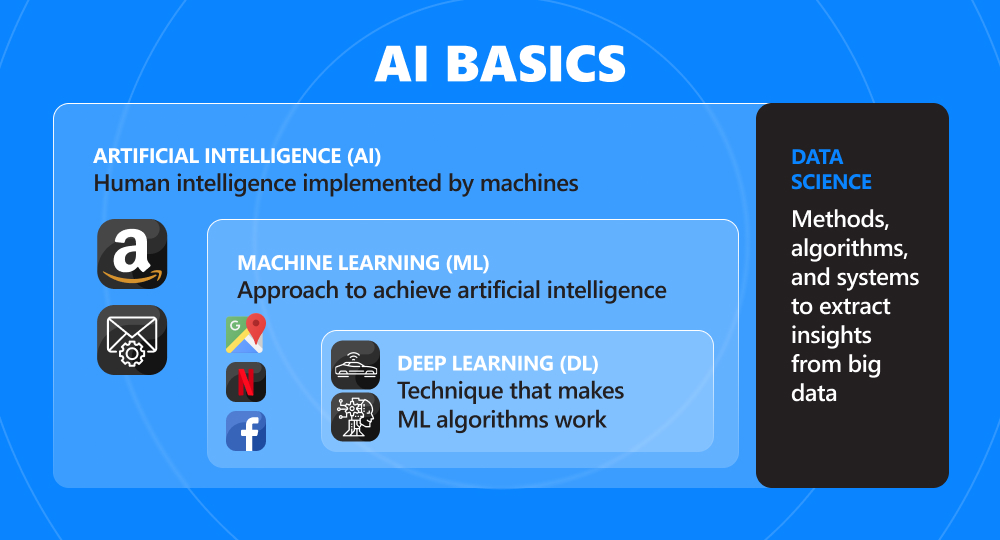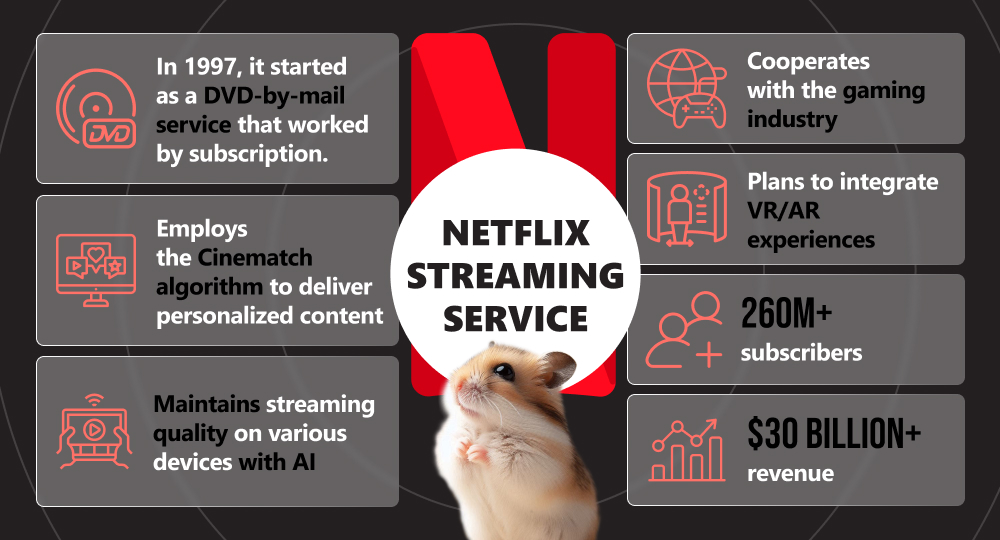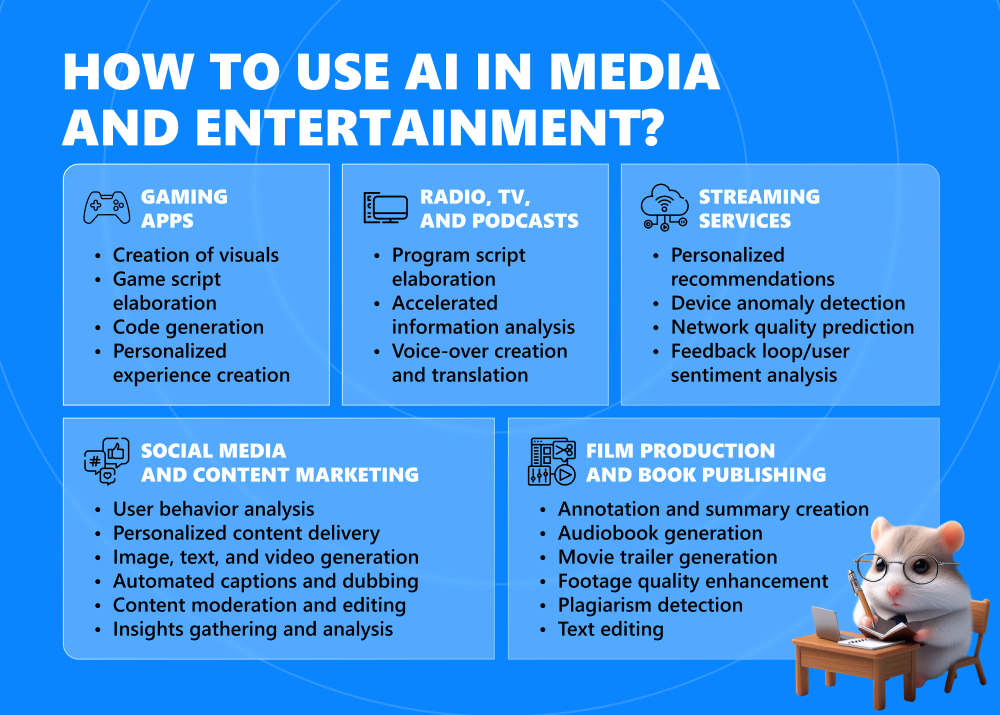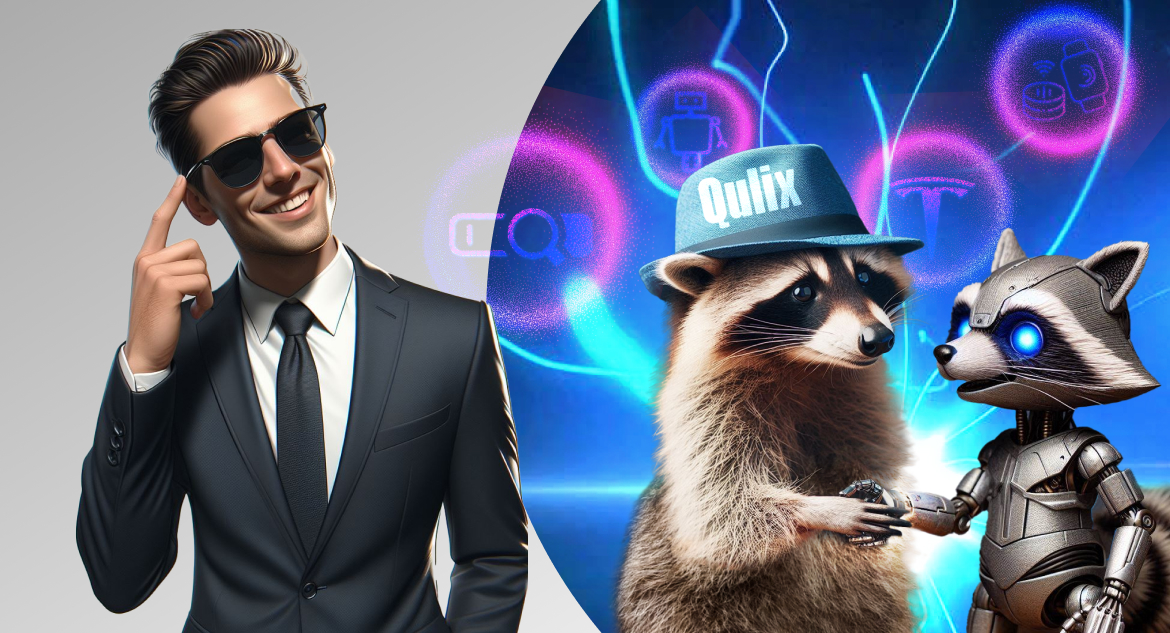One may mistakenly assume that the application of AI in entertainment and media is mostly about automation. Yet, its powers have spread far beyond that: and in this article, you will see how Netflix proves this point with their case.
Apart from that, you will find other ways of how AI is used in the entertainment industry. These examples may help you pick the most alluring scenario and battle-tested entertainment AI tools and integrate them into your business model. Let’s get started!
written by:
Anton Rykov
Product Manager
One may mistakenly assume that the application of AI in entertainment and media is mostly about automation. Yet, its powers have spread far beyond that: and in this article, you will see how Netflix proves this point with their case.
Contents
AI and Generative AI: What Is the Difference?
Artificial Intelligence is not a quirky contrivance of the latest years, the technology has been with us for several decades. Smart search engines and recommendation systems, self-driving vehicles and website chatbots, fingerprint authentication, and even predictive typing — these are several out of many examples of AI-based solutions.
But why are we witnessing such an upsurge of AI innovation now? The reason is GenAI. Yep, you've heard us, generative AI is a different technology that gave a new lease of life to algorithms and laid the groundwork for ChatGPT, DALL-E, and other suchlike tools.
Let's stack AI up against GenAI to grasp their potential.
Artificial Intelligence
Generative AI
Notion
A computer science branch responsible for the creation of machines, programs, or systems that implement tasks associated with the human brain's capabilities
AI models pre-trained on chunks of data patterns that are capable of generating new pieces of content (text, image, video, audio) in response to a user prompt
Key Functions
Data clusterization, regression, forecasting, dimensionality reduction, anomaly detection, natural language processing
Original content creation
Approach
Rule-based systems
Statistical models
Emergence period
1950s
2010s (after generative adversarial networks)
Use Cases
Recommendation systems, smart search engines, conversational chatbots, predictive analytics tools, automation tools, machine translation, voice-to-text conversion, predictive typing, facial/fingerprint authentication, monitoring systems
Image/text/video/music creation and editing, code generation, automated addition and translation of captions, virtual assistants, NFT generation
Examples
Chess computing game, Siri, Netflix recommendation engine, Microsoft Bing search, Google Translate
ChatGPT, Google Bard, DALL-E, Jasper
Netflix’s Success Secrets
Today, you can easily trace the applications of both AI and generative AI in the entertainment industry. But some market players had fallen back on algorithms long before they caught on and in this way outrun the competitors. As you might have guessed, Netflix, one of the most renowned streaming services, was among the trailblazers.
Many experts believe that the key reason behind a company's success is the ability of its masterminds to strike a fine balance between tech innovation and off-gauge business solutions.
Thus, by staking on budding eCommerce in 1997, Netflix introduced a DVD-by-mail service by subscription and made a name for itself. After integrating the Cinematch algorithm into the website to gain insights and deliver personalized content, the company boosted viewer engagement. To beat rivals like Disney or HBO, the service focused on adaptivity, i.e., it started optimizing streaming quality on various devices with AI.
Today, Netflix employs the technology for network quality characterization and forecasting, predictive caching, noise elimination, and device anomaly detection. What's more, the company playfully cooperates with the gaming field and even contemplates the idea of enriching its movies with VR/AR experiences. Considering such a forward-looking approach, it becomes clear why Netflix’s subscriber count surpasses 260M and brings the company over $30 billion in revenue.
Other AI Use Cases in the Media and Entertainment Industry
Analysts predict that the global AI market is forecasted to exceed $1.8 trillion by 2030. But what is the impact of AI in the entertainment industry? In search for the answer, let us scrutinize the tasks this tech wonder can handle.
Radio, TV, and Podcasts
There are several options to connect AI and media (broadcasting) with maximum value. First, you may leverage ChatGPT-like tools to elaborate program scripts or quickly scrutinize new material and prepare for shows. Secondly, by feeding the algorithm with your voice samples, you can create realistic voice-overs in other languages.
To get prompt updates on the use cases of AI in podcasting, subscribe to the newsletter by Paul McNally who conducts experiments with algorithms.
One more fascinating application of AI in entertainment is related to TV programming and consists in real-time translating of texts and voice-overs to sign language.
Gaming Apps
When answering “What is AI in entertainment?”, we can't neglect the gaming world. There, user preferences rely significantly on the visual appeal of characters, terrains, and environments, so designers use AI for inspiration or even entrust creative aspects of the game development process to the technology.
Nicholas Walton, CEO of Latitude.io, claims that algorithms help creators provide audiences with personalized entertainment experiences and enrich characters with emotional depth. He proves the statement with “AI Dungeon”, the company's AI-infiltrated game where players can select from multiple worlds and devise their own stories within it.
Streaming Services
As a streaming giant, Netflix epitomizes the key examples of AI in the entertainment field. Since we've already mentioned the company's story, let's just zero in on AI capabilities.
- Personalized content discovery experiences based on deep analysis of viewing history, audience preferences and individual tastes, and viewer behavior;
- Prioritizing reliability issues during the device anomaly detection process;
- Network quality prediction and video quality adaptation;
- Real-time feedback loop analysis;
- User sentiment analysis.
Social Media and Content Marketing
We won't make a startling discovery by saying that content feeds are infused with algorithms that analyze historical data and user behavior to match publications with the right audience and predict social media trends.
Marketing specialists can also unite social media and AI for user engagement. AI offers a plethora of solutions for image and video generation, automated captions and dubbing, content moderation and editing, valuable insights gathering and analysis, and much more. Just pick a tried-and-true tool and unlock all the benefits of AI in entertainment.
Film Production and Book Publishing
Here are some more fascinating trivia about the use of AI in media and entertainment. Those, who already detect plagiarism, edit texts, or create annotations with AI and seek offbeat solutions for the publishing field, may try automated audiobook generation. Besides, AI tools can help you with summaries or any type of marketing materials for book promotion.
Filmmaking industry representatives may also put the technology through its paces. Come to think of it: screenwriters already leverage AI to draw inspiration for jaw-dropping twists and endings, video designers delegate trailers or visual effects elaboration to algorithms, and shooting crews apply the technology to enhance footage quality.
One of such use cases of AI in entertainment (examples) is "Finding Dory" — a Disney movie where the technology was employed for image noise elimination.
AI Entertainment Tools: Expert Choice
AI and the entertainment industry go hand in hand, and there is no turning back. The only way to stay in the game is to keep a sharp eye on tech updates and wisely incorporate artificial intelligence entertainment tools into your business model.
For starters, take a closer look at these solutions:
- Deep AI (generates images and animates existing compositions);
- Dream by Wombo (creates images for various industries and turns them into cartoons);
- RunwayML (helps with image/video/audio creation and editing);
- RemoveBG (eliminates an image background in double-click time);
- thispersondoesnotexist (generates photos of people who do not exist);
- Animated Drawings (animates digital and physical drawings);
- video AI (creates slideshow videos with voice-overs based on texts);
- Gamma AI (makes presentations based on the input text and offers multiple templates);
- Narakeet (a text-to-audio conversion tool with the translation functionality);
- Veed.io (a text-to-video conversion tool with the translation functionality);
- Vidyo.ai (makes multiple short videos out of the input video for YouTube, TikTok, and Instagram);
- GoodContent (a book summary generator);
- Suno (an artificial intelligence media tool that generates unique music and soundtracks);
- Signapse (a sign-language avatar generator).
Final Word
Now you know how much fun and entertainment in AI can be. With the right combination of human supervision and strategic mindset, the technology allows for data-driven insights, significant cost savings, and production increase, as well as gives impetus to new AI media jobs and never-yet-seen experiences.
Thus, while your competitors steer clear of algorithms for fear of unemployment or other factors, act like Netflix: compare possible advantages and disadvantages of AI in entertainment and try to ride the wave of innovation.
Need strategic advice on how to apply artificial intelligence in the media industry? Reach out to Qulix, and we will help you incorporate the technology into your business model.
FAQ
Back in 1955, John McCarthy dubbed artificial intelligence (AI) “the science and engineering of making intelligent machines”. At the moment, it is considered one of the computer science branches responsible for the creation of machines, programs, or systems that implement tasks associated with human brain capabilities (e.g., visual perception, translation, reasoning, and speech recognition).
Both machine learning (ML) and deep learning (DL) are the subfields of artificial intelligence. However, while ML is an approach that allows machines to learn from data and makes AI work, deep learning is the technique that employs artificial neural networks and lays the groundwork for the ML implementation.
It's possible to apply both deep and machine learning in media. For instance, “Center Stage”, a webcam tool that keeps a user in the center of the screen during video shooting (even while moving around), is based on machine learning.
NLP stands for “Natural Language Processing” and means the AI branch that employs machine learning for text processing. The notion can also be defined as “the system's ability to understand and interpret the human language (written and spoken)”.
AI prompt elaboration is also a creative process of sorts. To make the result meet your expectations, stick to the following rules when composing a prompt: focus on one key goal, be precise, polite, and clear, mind your grammar, and add examples (if possible). More tips and expert suggestions on the topic await you here.
While staying at the dawn of progress, we already can't but notice the immense potential of artificial intelligence in the media and entertainment industry. For instance, such giants as Netflix, YouTube, and Amazon employ AI systems to deliver personalized recommendations, optimize streaming quality, and tailor content.
However, these are not the only AI applications in entertainment. By leveraging AI tools, you can also streamline the processing of vast datasets and create marketing strategies with targeted advertising campaigns, identify trends and build a deeper connection with your audience, automate tasks and boost operational efficiency.
When it comes to content creation for social media platforms, publishing frequency does matter. At this point, technology becomes a real life-saver, as it helps virtual influencers and SMM specialists stick to the content plan even in times of inspiration loss.
Here are the major use cases of both AI and generative AI in the media and entertainment sector:
- Content plan elaboration and scheduled publishing;
- Plot creation for reels and TikTok videos;
- Generation of visuals and custom avatars;
- Music, image, and video editing;
- Creation of unique soundtracks;
- Automated creation and translation of captions;
- Text voice-over synthesis.
The uses of AI in entertainment can also be traced in the world of TV programs and news media. For instance, by employing the technology's ability to detect objects, a shooting team can delegate the task of natural shot combining to AI-powered tools. Also, it's possible to enhance broadcasting quality with AI algorithms and turn the shooting process into a one-camera man's job. And last but not least application of AI in the media industry is the automated creation of accessible content (i.e., audio and sign-language descriptions).
When talking about AI/ML for media and entertainment, it’s worth mentioning its impact on the filmmaking process. At the moment, AI-driven tools help studios streamline creative processes (like screenwriting, teaser elaboration, sound editing, etc.), conduct audience analysis, and define character outfits and scenery. One of the examples of AI in the media and filmmaking industry is the sci-fi movie Sunspring.
In the wake of streaming services, Hollywood studios have also started looking for the best-fit applications of AI in entertainment and filmmaking. At the moment, they resort to AI solutions to facilitate screenwriting, recommend movies, create trailers, and optimize costs.
However, such a strategy leads to strikes by representatives of the Writers Guild of America (WGA). They face an existential crisis and consider AI's influence one of the reasons. At the same time, according to the survey, only 4% of Hollywood AI decision-makers expect the technology adoption to usher in job displacement.
The future of AI in entertainment is quite controversial. On the one hand, the new technology bodes well for content creators and takes the burden of repetitive, brain-intensive tasks from their shoulders. On the other — it leads to such issues as deep fakes, copyright infringement, job displacement, and ethical bias.
To put it briefly, each company should find the mean between automation and human intervention when elaborating its content strategy to stay afloat on the media AI market.
We are unlikely to witness such a scenario in the foreseeable future. First of all, AI algorithms still require significant enhancements to produce high-quality content without human supervision. Secondly, as long as filmmakers keep protecting their rights, AI use in entertainment will be limited. After all, most experts endorse the opinion that AI will be rather a tool to simplify various aspects of filmmaking than an employee replacement medium.
Among the concerns associated with artificial intelligence in entertainment, you may find intellectual property issues, downsizing, ethical bias, and hallucinations. Still, with the right combination of technology and human control, the advantages of AI in entertainment surpass the pitfalls.
It's hard to overestimate the significance of AI for media and entertainment companies, in particular for these industry players:
- Amazon Prime Video;
- The Walt Disney Company;
- YouTube;
- Meta;
- Spotify;
- Jukin Media;
- Netflix;
- Storyful.

Contacts
Feel free to get in touch with us! Use this contact form for an ASAP response.
Call us at +44 151 528 8015
E-mail us at request@qulix.com












